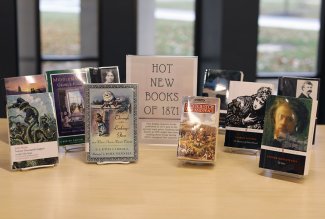
English faculty suggest novels for your 2022 reading list
Whether written in 1871 or 2021, a book that is distinctive and “speaks to something deeply and essentially human” will remain relevant through time and space, according to Jennifer Pullen, Ph.D., assistant professor of creative writing and fiction.
“This is why fairy tales have lasted for thousands of years, and travel and transform around the world, constantly being adapted,” she explains. “They are about basic human desires and concerns. Eros and Thanatos, sex and death. Who will I love? How will I survive a famine? What do I do when someone who should care for me persecutes me instead? How do I make it out in the world on my own?”
In recognition of ONU’s sesquicentennial, Heterick Memorial Library displayed classic works of literature dating to the time of ONU’s founding 150 years ago. From the delightful and resilient March sisters to the well-mannered but curious Alice Liddell, many wonderful characters and storylines from these 19th century novels still capture readers’ imaginations today and continue to be reimagined in film and story.
If you haven’t yet read these classics, consider putting one or more on your 2022 reading list. “Reading a book from the past is like conversing with a ghost,” says Pullen. “There is a mind on the page there, waiting with you, as alive as when it was written. For the book no time has passed at all. If we learn how to listen, it reminds us about what is essential to humanity and how much has changed.”
Favorites among ONU English faculty include The Moonstone (1868) by Wilkie Collins. “You can’t understand the modern mystery genre or the Gothic novel without reading The Moonstone,” says Pullen. Douglas Dowland, Ph.D., associate professor of English, adds, “It’s so weird! I mean that in a good way. Collins is playing with the mystery novel as a form … at the same time, it takes twists and turns … that one might not expect.”
Lewis Carroll’s Alice’s Adventures in Wonderland (1865) and Through the Looking Glass (1871) are “musts,” according to Lisa Robeson, Ph.D., professor of English, and Jennifer Moore, Ph.D., director of the School for the Humanities and Global Cultures and associate professor of creative writing. Robeson states: “The fantasy settings allow us to ‘see’ ourselves and life in ways that a realistic novel couldn’t.” Moore, who owns a treasured 1930s illustrated hardbound edition of Carroll’s classic, enjoys the author’s love for riddles, puzzles, poems and songs. “The rich worlds that Carroll created are so inventive, so immersive, wonderfully whimsical, and infinitely delightful,” she says.
The sweeping novel War and Peace (1869) by Leo Tolstoy is a personal favorite of both Robeson and Jonathan Pitts, Ph.D., associate professor of English. Pitts explains that through Tolstoy’s masterful storytelling, “we get to know the characters, and love them, even more intimately and humanely than we do people in real life.”
Middlemarch (1871) by George Eliot is an “amazing” read, claims Pullen, because of “the quality of its psychological insight and the way the characters jump off the page.” She points to the main character, Dorothea Brooke, “who wants so badly to do something important in the world, but because of the time in which she was born and her gender, isn’t allowed to.” Robert Scott, Ph.D., professor of English, also recommends Middlemarch for “its scope, vast array of characters, and vivid descriptions.”
Other impactful 1871 era classics include: Louisa May Alcott’s Little Women (1868) and Little Men (1871); Jules Verne’s Twenty Thousand Leagues Under the Sea (1870); and Charles Dickens’ Mystery of Edwin Drood (1870).
Flash forward 150 years to the present time, and ONU English faculty have a few recommendations for modern works of literature that they believe will still be relevant when ONU celebrates its tricentennial.
 Beloved by Toni Morrison
Beloved by Toni Morrison
Recommended by: Jennifer Moore
“I first read it several years ago and recently returned to it—what a story. Every sentence is so lush and so textured; the characters are haunting (and haunted—it is, essentially, a ghost story), and the narrative is searing. It’s a book you can’t forget.”
 Thomas Cromwell trilogy: Wolf Hall, Bringing Up the Bodies, and The Mirror and the Light by Hilary Mantel.
Thomas Cromwell trilogy: Wolf Hall, Bringing Up the Bodies, and The Mirror and the Light by Hilary Mantel.
Recommended by: Lisa Robeson
“Cromwell had a number of titles during his political career, but basically he was King Henry VIII’s chief of staff and ‘fixer.’ He ran the government and made sure Henry got what he wanted (including the execution of Anne Boleyn). The character development is among the most complex I’ve ever encountered and the trilogy is an amazing meditation on the effects of absolute power. No one should let the fact that it’s a trilogy stop them—you can read Wolf Hall and enjoy it on its own as a great novel. But if someone reads the first one, I’ll bet they continue on.”
 Convenience Store Woman by Sayaka Murata
Convenience Store Woman by Sayaka Murata
Recommended by: Douglas Dowland
“The novel’s narrator is a part-time convenience store worker in her mid-thirties. She finds her work fulfilling though her family and friends want her to do something ‘better,’ and by ‘better’ they mean fulfill traditional roles in society. The narrator tries this with comically disastrous results. The tension between individual and society is a classic theme in literature. Murata’s narrator is delightfully antisocial on the inside, though she’s learned how to mimic the ‘normal’ world. Reading it, I found myself at times laughing, at times shocked, and I never wanted to put the book down. How can we relate to others and still be ourselves? How do we resist pressures to conform? These questions are the making of a classic.”
 How Much of These Hills is Gold by C. Pam Zhang
How Much of These Hills is Gold by C. Pam Zhang
Recommended by: Jennifer Pullen
“This book takes that deeply American genre, the western, and reminds readers that the West (where I am from) isn’t populated only by white men galivanting through prairies and mountains, and in fact, never was. It follows two sisters, daughters of a Chinese immigrant, who have to survive on their own when their abusive father dies, and come to their own identities and a relationship to the country in which they’ve been marooned. The prose is gorgeous, the characters compelling, and the story gripping. Simultaneously, it grapples with classic Americana, not only to undermine stereotypes embedded within it, but also with a kind of love of the idea of the Western landscape as a place where terrible things have been done, but also, where people have made themselves anew.”
 Lonesome Dove by Larry McMurtry
Lonesome Dove by Larry McMurtry
Recommended by: Jonathan Pitts
“Being from Montana, I’ll recommend Lonesome Dove by Larry McMurtry, which focuses on the friendship between two old cattlemen, Augustus McCrae and WF McCall, and their adventures on the cattle trail from Texas to Montana. While the novel focuses on the cattle drive, peopled as it is by a familiar but beautifully written cast of Western American humanity, the center of the story is really the love between Gus and Call.”
 The Namesake by Jhumpa Lahiri
The Namesake by Jhumpa Lahiri
Recommended by: Robert Scott
“The Namesake covers five primary periods of the life of the Ganguli family, an Indian family who come to the U.S. in search of a better life. The novel depicts the trials and victories of the Ganguli family as they gradually adopt American ways while still trying to maintain certain Indian practices. It focuses on Gogol, a young man whose life takes a series of unexpected turns as he struggles with his namesake. I recommend the novel for its subtlety, lyrical descriptions and insight into how families work.”